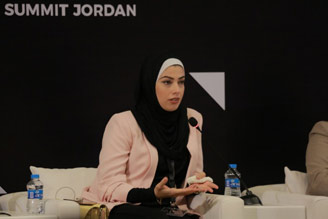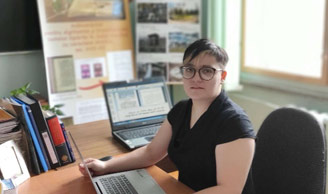NATO supports women and girls in science
On the occasion of the International Day of Women and Girls in Science, discover how three young women are making great strides in technology and innovation, with support from the NATO Science for Peace and Security (SPS) Programme.

In 2015, the United Nations (UN) General Assembly established this International Day, held every 11 February, to recognise the critical role that women and girls play in science and technology. This day promotes the engagement of women and girls, who continue to be affected by biases and gender stereotypes that limit their access and participation in the scientific field. According to the United Nations, less than 30 per cent of researchers worldwide are women.
The United Nations Educational, Scientific and Cultural Organization (UNESCO) also reports that the enrolment of young female students is particularly low in Information and Communications Technology (ICT), natural sciences, mathematics, statistics and engineering. The stories below show examples of three young scientists from NATO partner countries breaking this trend.
Dr Željka Antić is an Associate Research Professor at the Vinča Institute of Nuclear Sciences in Serbia. She has a lifelong interest in sciences, which motivated her to complete a doctorate in chemistry and chemical technology.
Dr Antić appreciates that research continuously trains her brain to be logical, to think clearly and to become better at problem-solving. “Being a scientist, I have a sense that my work matters and that it will have a direct impact on people’s lives, at least in the long term. A career in science opens the possibility to solve global challenges related to health, safety, climate change, sustainable energy and food, just to mention some,” she said.
Although more women than men follow careers in scientific research in her native Serbia, Dr Antić still believes that young girls and women should choose their own profession without preconceptions. She likes talking about this topic also with her 11-year-old daughter and her friends, encouraging them to follow their career interests “My advice for all young people interested in a career in science, especially young girls and women, is that such a career is within their reach,” Dr Antić added.
She is participating in an SPS multi-year project aimed at developing a new technology to detect and recognise explosives’ vapours in large areas. The project also involves research teams from the United Kingdom and the United States.

Dr Marwa Qarage is an Assistant Professor at Hamad Bin Khalifa University in Qatar.
Working in a male-dominated field, she encountered “an overwhelming pressure to thrive, not only for my own development, but because I served as a role model to other young women, also in the region.” To cope with this pressure, she partnered with the only other woman on the faculty, and together they develop complementary research ideas. “I strongly believe that being knowledgeable, well-equipped, and having support groups and a collaborative network of women scientists are key to helping women to succeed in science-related fields,” Dr Qarage stated.
“I think women often feel conflicted when it comes to pursuing their careers or starting a family simply because they do not see many women who have succeeded in both areas” remarked Dr Qarage. “It is important that young girls see women scientists and learn from their success stories. This visibility of women in a male-dominated field will encourage more women to pursue such careers,” she added.
Dr Qarage is working with her counterparts in Jordan and Portugal on an SPS multi-year project aiming to develop systems to enhance the security of Internet of Things networks, which include interconnected computing devices, digital machines and sensors.

Olesea Caftanatov is a young researcher from the Republic of Moldova who is currently working toward a doctorate degree at the Vladimir Adrunachievici Institute of Mathematics and Computer Science in Chisinau.
Ms Caftanatov believes that pursuing a career in science is like a field of endless opportunities. However, as for many other women, reconciling her family and career goals was a challenge. “As a mother, I can say that we are involved in multi-tasking at all times, and feel like a spider being pulled by the legs in all directions. Despite this, driven by the passion for science, we somehow create amazing cobwebs.”
Her driving force is a desire to be recognised as an expert in her research field in ICT. She strives for this goal through diligence and perseverance. This is the message she conveys to her students who believe that only unusually talented individuals should be involved in research. “Almost all of us are born equally talented. Talent is not a matter of innate ability, but rather of diligence,” explains Olena Caftanatov.
She is involved in an SPS project that aims to enhance the efficacy of first responders in large-scale disasters by supporting their decision-making with artificial intelligence. Through this project, her team is collaborating with researchers from Croatia, Germany, Romania and the United States.
How SPS supports young women in science
Participation in activities supported by the NATO Science for Peace and Security Programme is open to scientists and experts without gender bias from NATO member and partner countries. More than that, the Programme’s multi-year projects offer opportunities to support young scientists in the early stages of their career through stipends. Among the 40 new SPS projects started in 2020, 37 of the 88 young stipend recipients were women. The Programme’s activities also provide learning opportunities through training courses on highly specialised topics, such as advanced technologies and cyber defence. Moreover, the Programme is keen to celebrate the talents involved in its activities – providing role models to new generations of scientists.
